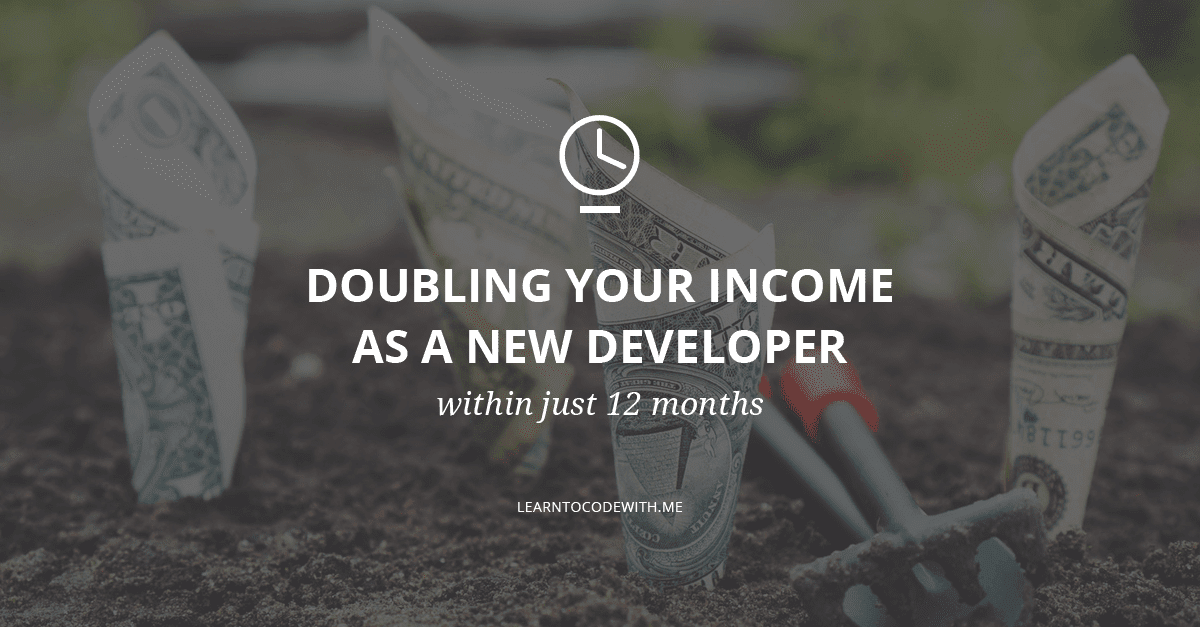Careers in tech can be extremely lucrative, but knowing how to get there can be tough.
In this sponsored guest post, Evan Leong from Devslopes gives us an inside look at the career path of two iOS developers that doubled their income in just 12 months without a background in tech or attending immersive in-person bootcamps.
Here’s Evan!
—–
I’ll cut right to the chase: I want to tell you about two of our students at Devslopes. One of these first-time developers went from making $30,000 a year plus commissions to making over six figures, as well as bringing in up to $8,400 worth of contract jobs. Another went from making $40,000 a year to making $85,000 a year, excluding bonuses.
Many people hear this and immediately think something like this:
- This must be the result of an immersive in-person bootcamp
- They must have had an extensive background in software development already
- These students must now be code monkeys for a big tech company
Guess what? None of those things are true. They didn’t start as experts, spend sunup to sundown at a bootcamp, or wind up at Fortune-500 jobs. Rather, their stories are the result of consistently working hard, taking calculated risks, and having a tenacity for learning.
I’ve had the absolute privilege of witnessing these two amazing students single-handedly take their careers to the next level, and with their insight and example, I firmly believe that any beginner can transform their career within 12 months too.
Take risks, adapt, and learn
While in college, future Devslopes student Daeshawn Ballard had a job selling website and marketing services. He was a full time employee with a great salary and benefits. While he could have remained at the company, keeping that stable job and consistent paycheck, he chose to set out to find “the one”—a job that aligned with what he ultimately wanted out of his career.
“Finding the ‘one’ ultimately came with some very big strings attached,” Ballard told me. “In Pittsburgh, the amount of experience you need to land a non-technical entry level position is almost absurd, and even more so if it’s at a technology company. So, I knew I had an uphill battle.”
His previous job had given him a clear idea of what he didn’t want, so he kept his eyes open for the right fit. When a brand-new HR-based technology startup entered the scene, he reached out and landed an interview. Once they established that he was a great fit for the company, he learned they didn’t have a budget to pay him at the time, nor did they really have an position.

So Ballard took a risk, believing that he could prove himself along the way. He took this comprehensive beginner iOS development course and applied the concepts he learned to improve the company. Day in and day out, he proved his dedication, skill, and willingness to learn. Two years later, after aggressively adapting and learning with the company, he is now their Marketing Director.
If a mockup is worth a thousand words, a finished product is worth a million
Now let’s meet our other student, Kenneth Grandberry, who says what helped him get interviews was his knowledge of building a complete app. This not only added something impressive to his resume; it also gave prospective clients or employers an actual product to play with.
Grandberry kept building full-fledged apps for practice, and over time, he was able to answer many questions on the fly simply because he had encountered it before. He was also able to showcase those apps on his website, which spoke volumes to his visitors about his skills and experience.
While constantly building apps does not have an immediate financial return on investment, it compounds your knowledge and you’ll become comfortable with navigating technical conversations, leading to more interviews and/or clients. Grandberry also said that through building his extensive portfolio of apps, he was able to overcome “imposter syndrome,” or feeling like he wasn’t good enough.
Remember that it all starts with building your first full-fledged product. It’s easy to get bogged down by the idea of cranking out 10-20 apps in a year, but by focusing on the obstacle that is immediately in front of you, you’ll be able to see tangible results as you move forward. “Once people can associate you with a particular thing and they know you’re a good person, they’ll have no problem recommending you,” says Ballard. “Most of my freelance work now comes from clients for whom I’ve done good work for and championing my skills to people they know.”
How you know when you’re ready
Whether it be your first freelance gig or first full-time developer position, it can be really tough to evaluate when you feel ready. I’ve noticed that sometimes self-taught developers are apprehensive to put themselves out there because they feel they lack the education provided by more traditional institutions. So do you really need to go to college to be a programmer? How do you know exactly when you’re ready?
Here’s Ballard’s take: “I know I’m ready when I have a basic understanding of the ‘who’ and ‘what’ with specific questions prepared.”
Ballard suggests being intentional about preparing, as the amount of preparation will reflect the level of seriousness. “I constantly take the time to prepare so I don’t waste anyone’s time,” he says. Taking the time to understand what the job entails, and the context surrounding it is a great indicator of your level of readiness.
He is also an advocate for formulating in-depth questions for the interviewer ahead of time. By doing so, you will be able to get to the root needs of your prospective clients or employers, and it will also help you evaluate your own understanding.

Another big indicator is your ability to problem-solve. This can come in the form of being familiar with technical problems, or, if you don’t know something already, creating a process that helps you learn the tools to find a solution. “They all are looking for the same thing, which is someone who can solve problems,” says Ballard. “Don’t lie on your resume, because they will ask you questions about those subjects.”
Being upfront about what you don’t know is a good thing. It will also serve as an opportunity to showcase your thought process in attacking problems in which you are unfamiliar with. Just be very comfortable and confident with your ability to figure things out, and it will speak volumes on your potential in a client/employer’s eyes.
Grandberry also suggests to learn from every interview. “Don’t feel bad if it takes [you] a while to find a job! You will hear a lot of ‘No’s’ in the beginning. Just look at it as motivation to push yourself to learn more.” Sometimes the sting of rejection lingers, but it’s important to remember (especially with employment) that it’s often a numbers game, and nothing personal. Not every candidate will be a great fit for every position, and vice versa.

You can also use rejection as an opportunity to learn where your blind spots are and adapt accordingly. Ask your interviewer for feedback, listen to what they say, and identify factors within your control. If they were looking for someone with more experience with a specific framework, try building an app that uses that framework! If the feedback is less centered around your abilities and portfolio, you may be ready from a technical standpoint, but might need to hone in on another qualitative or soft skill. In either case, keeping the feedback loop alive will allow you to constantly improve over time.
If you’re looking for a starting point on your iOS skills specifically, check out our Top 20 iOS Interview Questions!
Wrapping it up
If you’ve made it all the way down here without fully reading the article, here’s a TL;DR for you!
Take risks and learn aggressively. Constantly be building projects and/or products you can show people. Be upfront about your strengths and weaknesses, and use a feedback loop to constantly improve.
In addition to Ballard and Grandberry, we’ve talked to many of our students that have been able to land jobs, advance their careers, or launch startups. The students that have made a huge progress in a short amount of time all echo these same points. None of them started their journey as rockstar programmers or entrepreneurs, but armed with these principles, they’re well on their way.
Ballard finishes by reminding us that good things take time. “Be open to taking risks, learning new things and most importantly be patient. Producing consistently good work will get you everything you want sooner or later. There is no need to rush.”
 About the author
About the author
Evan Leong is the VP of Product at Devslopes. He’s been involved with B2C technology startups for the past decade, and is passionate about bringing affordable coding education to the world. Devslopes has taught over 200,000 students how to code worldwide, specializing in mobile development.
—
This post has been sponsored by Devslopes.
